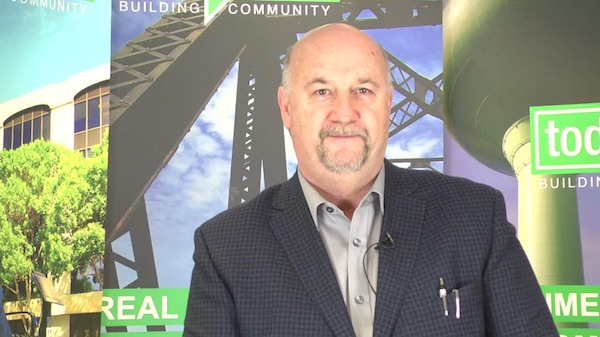Alberta
“Kind of a win” – Red Deer Chamber of Commerce pushing province for fewer restrictions on business

The battle against COVID has been a rollercoaster of turmoil for the business community. Restrictions and uncertainty are the rule and business owners as well as their employees are paying a heavy price to protect the rest of the population.
In the last week Red Deer & District Chamber of Commerce sent a letter to Premier Kenney to ask for fewer restrictions. The Chamber also sent out a survey to all 850 businesses they represent to get more information for future action. The ultimate goal is to convince the province to concentrate the battle against COVID on the protection of Alberta’s most vulnerable, while allowing the vast majority of younger and healthier people to live as regular a life as possible.
Rick More, CEO of Red Deer’s Chamber was watching closely Friday when the province announced a framework for reopening businesses. Here are what those steps will look like.
Step 1: Hospitalization benchmark – 600
- Potential easing of some restrictions related to:
- Indoor and outdoor children’s sport and performance (school-related only)
- Indoor personal fitness, one-on-one and by appointment only
- Restaurants, cafes, and pubs
Step 2: Hospitalization benchmark – 450
- Potential easing of some restrictions related to:
- Retail
- Community halls, hotels, banquet halls and conference centres
- Further easing of some restrictions eased in Step 1
Step 3: Hospitalization benchmark – 300
- Potential easing of some restrictions related to:
- Places of worship
- Adult team sports
- Museums, art galleries, zoos and interpretive centres
- Indoor seated events, including movie theatres and auditoriums
- Casinos, racing centres and bingo halls
- Libraries
- Further easing of some restrictions eased in Steps 1 and 2
Step 4: Hospitalization benchmark – 150
- Potential easing of some restrictions related to:
- Indoor entertainment centres and play centres
- Tradeshows, conferences and exhibiting events
- Performance activities (e.g., singing, dancing, wind instruments)
- Outdoor sporting events (e.g., rodeo)
- Wedding ceremonies and receptions
- Funeral receptions
- Workplaces – lifting work-from-home measures
- Amusement parks
- Indoor concerts and sporting events
- Festivals, including arts and cultural festivals (indoor and outdoor)
- Day camps and overnight camps
- Further easing of some restrictions eased in Steps 1-3
More calls this framework a partial victory for struggling businesses. Here’s his initial reaction to the Premier’s announcement.
Alberta
Nobel Prize nods to Alberta innovation in carbon capture

From the Canadian Energy Centre
‘We are excited to bring this made-in-Canada innovation to the world’
To the naked eye, it looks about as exciting as baking soda or table salt.
But to the scientists in the University of Calgary chemistry lab who have spent more than a decade working on it, this white powder is nothing short of amazing.
That’s because the material they invented is garnering global attention as a new solution to help address climate change.
Known as Calgary Framework-20 (CALF-20 for short), it has “an exceptional capacity to absorb carbon dioxide” and was recognized in connection with the 2025 Nobel Prize in Chemistry.
“It’s basically a molecular sponge that can adsorb CO2 very efficiently,” said Dr. George Shimizu, a UCalgary chemistry professor who leads the research group that first developed CALF-20 in 2013.
The team has been refining its effectiveness ever since.
“CALF-20 is a very exciting compound to work on because it has been a great example of translating basic science into something that works to solve a problem in the real world,” Shimizu said.
Advancing CCS
Carbon capture and storage (CCS) is not a new science in Alberta. Since 2015, operating projects in the province have removed 15 million tonnes of CO2 that would have otherwise been emitted to the atmosphere.
Alberta has nearly 60 proposed facilities for new CCS networks including the Pathways oil sands project, according to the Regina-based International CCS Knowledge Centre.
This year’s Nobel Prize in Chemistry went to three of Shimizu’s colleagues in Japan, Australia and the United States, for developing the earliest versions of materials like CALF-20 between 1989 and 2003.
Custom-built molecules
CALF-20 is in a class called metal-organic frameworks (MOFs) — custom-built molecules that are particularly good at capturing and storing specific substances.
MOFs are leading to new technologies for harvesting water from air in the desert, storing toxic gases, and capturing CO2 from industrial exhaust or directly from the atmosphere.
CALF-20 is one of the few MOF compounds that has advanced to commercial use.
“There has been so much discussion about all the possible uses of MOFs, but there has been a lot of hype versus reality, and CALF-20 is the first to be proven stable and effective enough to be used at an industrial scale,” Shimizu said.
It has been licensed to companies capturing carbon across a range of industries, with the raw material now being produced by the tonne by chemical giant BASF.
Carbon capture filter gigafactory
Svante Inc. has demonstrated its CALF-20-based carbon capture system at a cement plant in British Columbia.
The company recently opened a “gigafactory” in Burnaby equipped to manufacture enough carbon capture and removal filters for up to 10 million tonnes of CO2 annually, equivalent to the emissions of more than 2.3 million cars.
The filters are designed to trap CO2 directly from industrial emissions and the atmosphere, the company says.
Svante chief operating officer Richard Laliberté called the Nobel committee’s recognition “a profound validation” for the entire field of carbon capture and removal.
CALF-20 expansion
Meanwhile, one of Shimizu’s former PhD students helped launch a spinoff company, Existent Sorbents, to further expand the applications of CALF-20.
Existent is working with oil sands producers, a major steel factory and a U.S.-based firm capturing emissions from other point sources, said CEO Adrien Côté.
“The first users of CALF-20 are leaders who took the risk of introducing new technology to industries that are shrewd about their top and bottom lines,” Côté said.
“It has been a long journey, but we are at the point where CALF-20 has proven to be resilient and able to survive in harsh real-world conditions, and we are excited to bring this made-in-Canada innovation to the world.”
Alberta
Thousands of Albertans march to demand independence from Canada

From LifeSiteNews
Thousands of Albertans marched upon the province’s capital of Edmonton this past Saturday in the “I Am Alberta Rally,” calling for the province to immediately secede from Canada in light of increasing frustration with the Liberal federal government.
The rally saw an estimated 20,000 to 30,000 people march on the steps of the Alberta legislative building, demanding that a referendum be held at once to allow Alberta to leave Canada.
“We can’t delay. We can’t slow down,” well-known freedom lawyer Keith Wilson said at the rally as he spoke to the crowd.
“This is our moment. This is our future. For our families, for our children, for Alberta. Alberta will be free.”
The group behind the rally, the Alberta Prosperity Project (APP), bills itself as a sovereignty advocacy group. As reported by LifeSiteNews earlier this year, the APP wants to put Alberta independence to a question to the people via a referendum.
The rally also comes after certain members affiliated with the APP such as Jeffrey Rath and Dr. Dennis Modry earlier the month met in Washington, D.C. with cabinet-level U.S. politicians to discuss Alberta’s potential independence from Canada.
U.S. President Donald Trump has routinely suggested that Canada become an American state in recent months, often making such statements while talking about or implementing trade tariffs on Canadian goods.
The APP on July 4 applied for a citizen-led petition presented to Elections Alberta that asks, “Do you agree that the Province of Alberta shall become a sovereign country and cease to be a province in Canada?”
The group is hoping to have the referendum on the ballot as early as next year and has accused the Liberal federal government of encroaching on Alberta’s ability to manage its own affairs.”
The group says an independent Alberta would allow it to “keep our resources, grow our economy, and reinvest in Alberta families, businesses and infrastructure.”
As it stands now, the referendum question has been referred to the courts to see whether or not it can proceed.
Alberta Conservative Premier Danielle Smith does not support a fully independent Alberta. However, she does advocate for the province to have more autonomy from Ottawa.
As reported by LifeSiteNews, Smith said her conservative government will allow but not support a citizen-led referendum on independence.
Despite not advocating for an outright separate Alberta, Smith’s government has not stood still when it comes to increasing provincial autonomy.
Smith’s United Conservative government earlier this year passed Bill 54, which sets the groundwork for possible independence referendums by making such votes easier to trigger. The bill lowers the signature threshold from 600,000 to 177,000.
As reported by LifeSiteNews last week, Smith’s government introduced a new law to protect “constitutional rights” that would allow it to essentially ignore International Agreements, including those by the World Health Organization (WHO), signed by the federal Liberal government.
The calls for independence have grown since Liberal leader Mark Carney defeated Conservative rival Pierre Poilievre.
Carney, like former Prime Minister Justin Trudeau before him, said he is opposed to new pipeline projects that would allow Alberta oil and gas to be unleashed. Also, his green agenda, like Trudeau’s, is at odds with Alberta’s main economic driver, its oil and gas industry.
-

 Internet1 day ago
Internet1 day agoMusk launches Grokipedia to break Wikipedia’s information monopoly
-

 Business1 day ago
Business1 day agoCanada heading into economic turbulence: The USMCA is finished and Canadian elbows may have started the real fight
-

 Business2 days ago
Business2 days agoCanada has given $109 million to Communist China for ‘sustainable development’ since 2015
-

 Business1 day ago
Business1 day agoBill Gates walks away from the climate cult
-

 Opinion2 days ago
Opinion2 days agoBritish Columbians protest Trump while Eby brings their province to its knees
-

 MAiD2 days ago
MAiD2 days agoStudy promotes liver transplants from Canadian euthanasia victims
-

 Business24 hours ago
Business24 hours agoFord’s Liquor War Trades Economic Freedom For Political Theatre
-

 National18 hours ago
National18 hours agoCanadian MPs order ethics investigation into Mark Carney’s corporate interests










